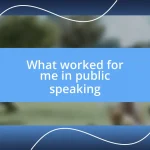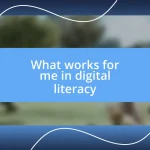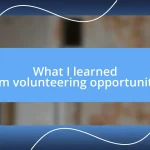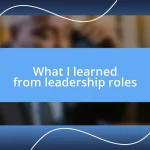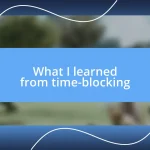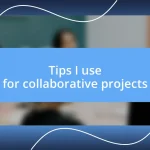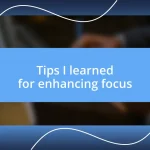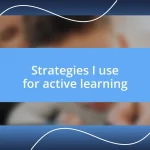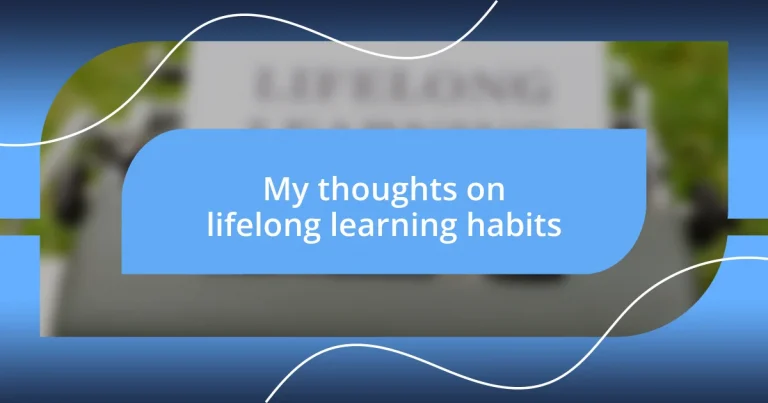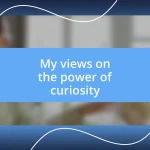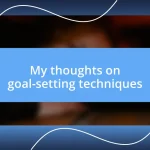Key takeaways:
- Lifelong learning fosters personal growth through new experiences, enhances skills, and builds identity by transforming hobbies into passions.
- Establishing a consistent learning routine and utilizing diverse resources, such as podcasts and community engagement, significantly aids in sustaining the learning journey.
- Overcoming learning challenges involves a positive mindset, focused strategies to minimize distractions, and prioritizing self-care to maintain motivation and well-being.
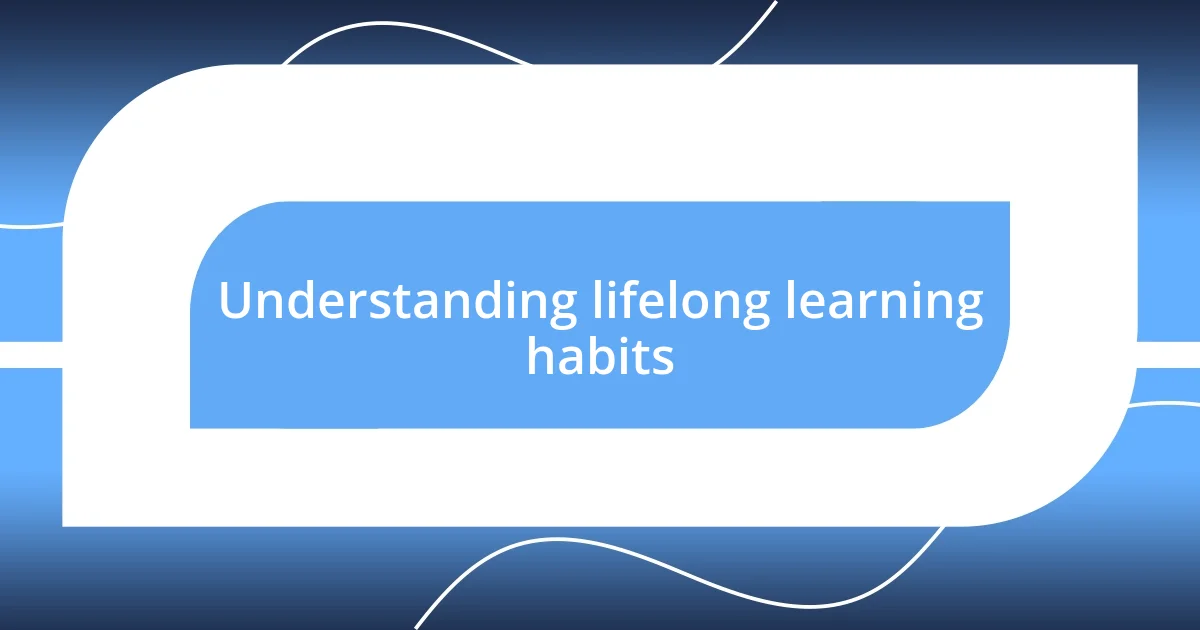
Understanding lifelong learning habits
Lifelong learning habits are more than just a commitment to education; they represent a mindset shift. I remember a time when I picked up guitar lessons purely for fun. What started as a casual pastime turned into an ongoing passion, showing me that the desire to learn often evolves into a fulfilling journey.
When I think about my lifelong learning experiences, I realize they’ve shaped not just my skills but my identity. For instance, I once enrolled in a public speaking course to overcome my shyness. Not only did I gain confidence, but I also discovered a love for sharing ideas—an unexpected joy that sparked a continuous quest for knowledge. Isn’t it fascinating how a single choice can cascade into new opportunities?
Understanding lifelong learning habits means recognizing that learning can happen anywhere and at any time. Have you ever learned something valuable from a conversation with a friend? I have. Those everyday exchanges often teach me as much, if not more, than structured classes. It’s this understanding that fuels my belief that every moment offers a chance to learn and grow.
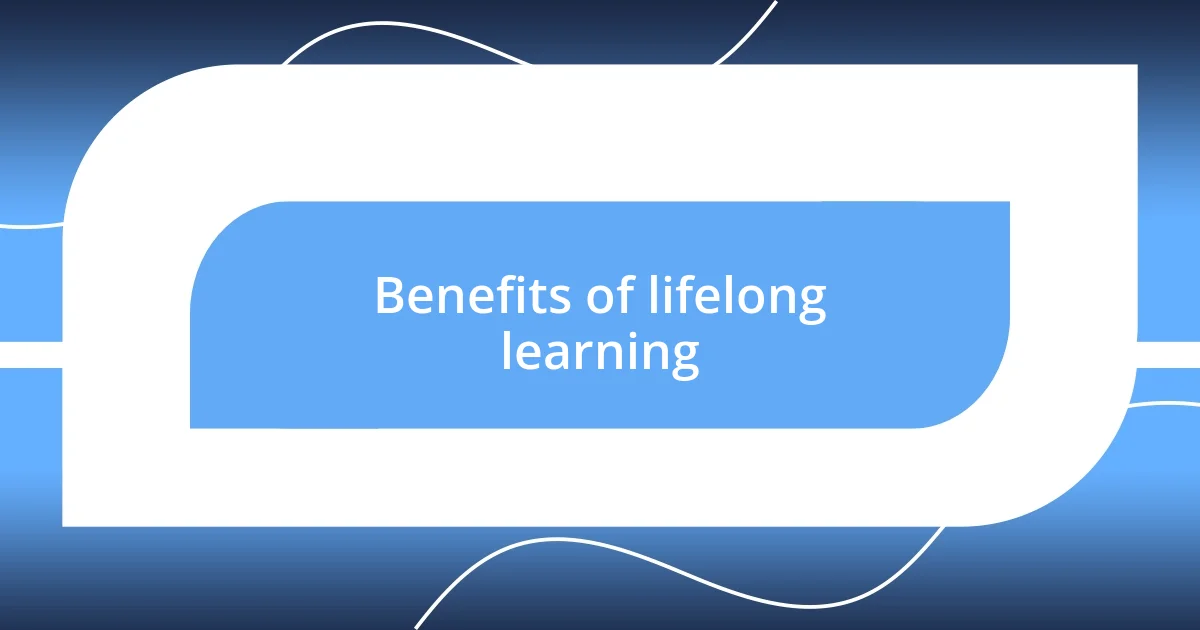
Benefits of lifelong learning
Lifelong learning opens doors I never knew existed. There was a summer when I decided to take an online course in photography. Initially, I just wanted to capture better vacation memories, but it quickly transformed into a new hobby. I learned to see the world from different perspectives, and every click of the shutter felt like a step towards self-discovery.
As I embrace lifelong learning, I notice it enhances my adaptability. When my company implemented new software, my willingness to learn made the transition smoother. Rather than feeling overwhelmed, I felt excited to upgrade my skills. This adaptability has not only made me a more competitive professional but also fills me with a sense of accomplishment. Doesn’t it feel good to be ready for whatever comes next?
One of the most rewarding benefits I’ve experienced is the boost in my mental well-being. I recently joined a book club, which not only satisfies my curiosity but also connects me with a wonderful group of people. Sharing and discussing new ideas has had a profound effect on my happiness and sense of belonging. The joy of learning alongside others has made me appreciate the beauty of shared experiences.
| Benefit | Description |
|---|---|
| Enhanced Skills | Opens doors to new hobbies and insights, leading to personal growth. |
| Increased Adaptability | Fosters resilience in the face of changes, making challenges more manageable. |
| Improved Mental Well-Being | Creates fulfilling social connections and boosts happiness through shared learning experiences. |
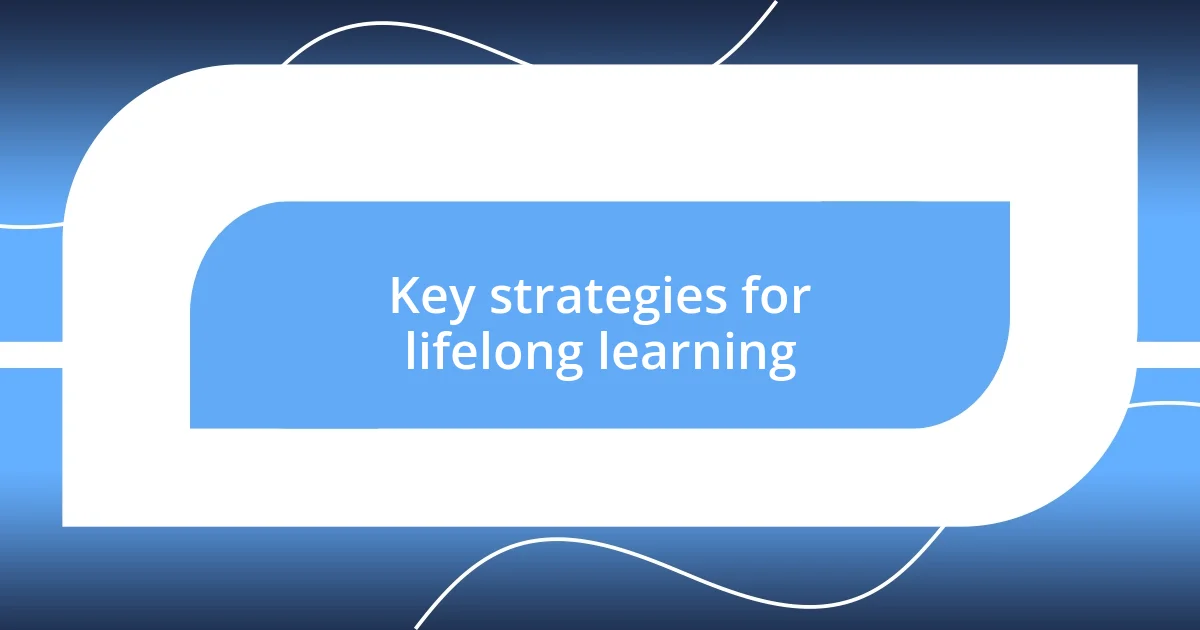
Key strategies for lifelong learning
Engaging in lifelong learning requires intentional strategies to keep the momentum going. I find that setting aside dedicated time each week for learning helps to make it a priority. There was a phase when I committed every Saturday morning to exploring a new hobby or topic, and I was amazed at how much I expanded my knowledge base in just a few months. It’s like carving personal time for self-discovery.
To sustain this journey, consider the following strategies:
- Establish a Learning Routine: Block out specific times each week to focus on your learning activities.
- Diversify Resources: Use various formats like podcasts, online courses, or books to keep your learning fresh and engaging.
- Connect with Others: Join learning groups or forums that align with your interests to share experiences and gain new perspectives.
- Set Personal Goals: Identify specific skills or knowledge you want to develop and track your progress over time.
- Reflect on Your Learning: Spend time reviewing what you’ve learned; journaling your experiences can deepen understanding and retention.
Creating these strategies can motivate and inspire you, turning learning into a lifelong adventure. I remember when I started a language-learning app on my phone during my commute. Initially, I found the time spent so valuable. Over time, it turned into my daily ritual, and now, I enjoy conversations in a new language, which fills me with pride and excitement for what’s next.
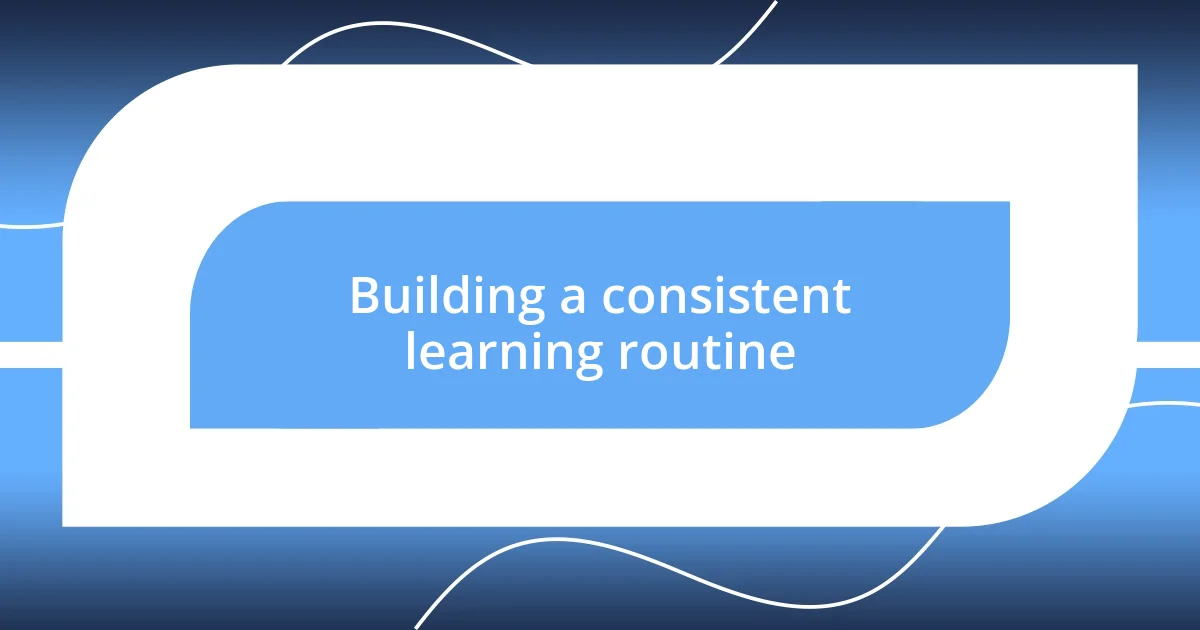
Building a consistent learning routine
Building a consistent learning routine can be transformative. I remember when I decided to wake up 30 minutes earlier each day to read a chapter from a nonfiction book. At first, the idea felt daunting, but soon it turned into a cherished part of my morning ritual. Isn’t it amazing how a small change can lead to something so fulfilling?
In my experience, pairing learning with daily activities has been a game-changer. For instance, I often listen to educational podcasts while cooking dinner. It keeps my mind engaged and turns what could be a mundane task into a meaningful session of growth. Have you ever tried to integrate learning with something you already do? It’s like sneaking in veggies in a delicious dish—so easy and rewarding!
Setting specific goals has also been critical in maintaining my routine. Initially, I aimed to learn two new skills each month, which kept me motivated. Over time, I learned to celebrate even the small victories, like mastering a tricky recipe or completing an online course. Those moments of achievement remind me that consistency doesn’t have to be about grand gestures but rather about the steady progress we make, day by day.
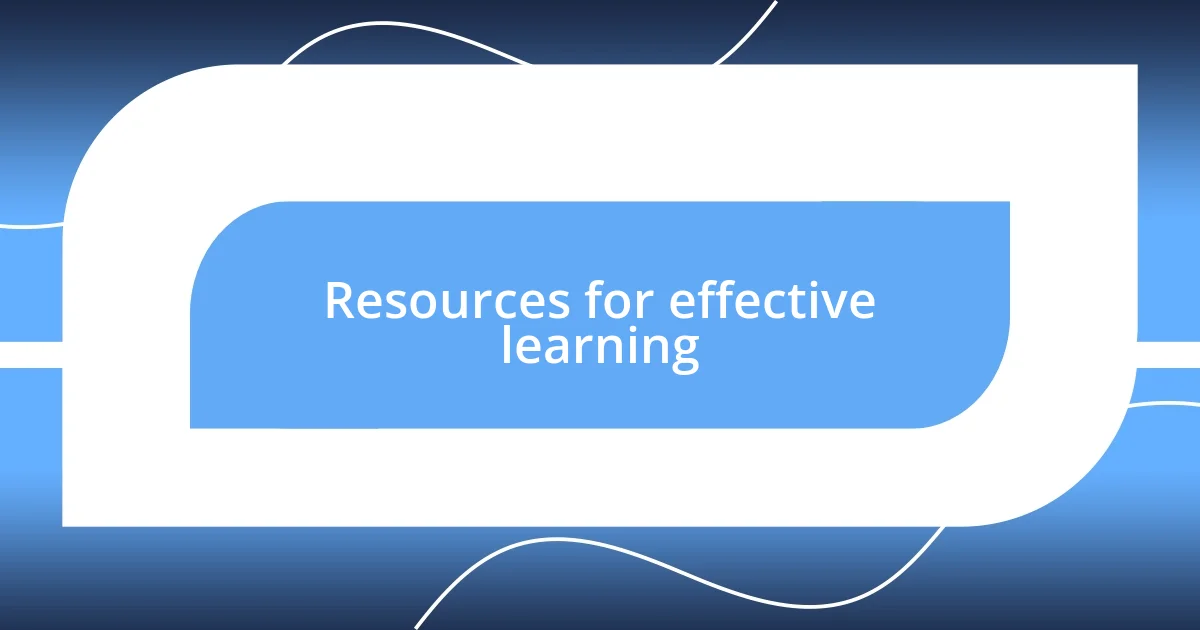
Resources for effective learning
When it comes to effective learning resources, I’ve found that leveraging diverse platforms makes a significant difference. For example, I stumbled upon a free online course platform, and it opened my eyes to a wealth of knowledge. I took a coding class that transformed my understanding of technology, something I never thought would excite me. Have you ever felt that spark when you discover a resource that feels just right? It’s invigorating.
Another resource I highly recommend is using social media intelligently. I follow educators and thought leaders on platforms like Twitter and LinkedIn, which keeps me updated with insightful articles and discussions. Engaging with these thought leaders offers continual inspiration and often leads me to discover new topics of interest. I can’t help but wonder—how many transformative ideas are just a tweet away?
Lastly, I urge you not to overlook the power of community. I joined a book club a few years ago, and it was a game changer. Sharing insights and discussing interpretations not only deepens understanding but also enriches the learning experience. Plus, it creates a sense of accountability. Do you have a group of friends or colleagues you could engage with regularly? Those discussions can elevate your learning beyond what you might do alone.
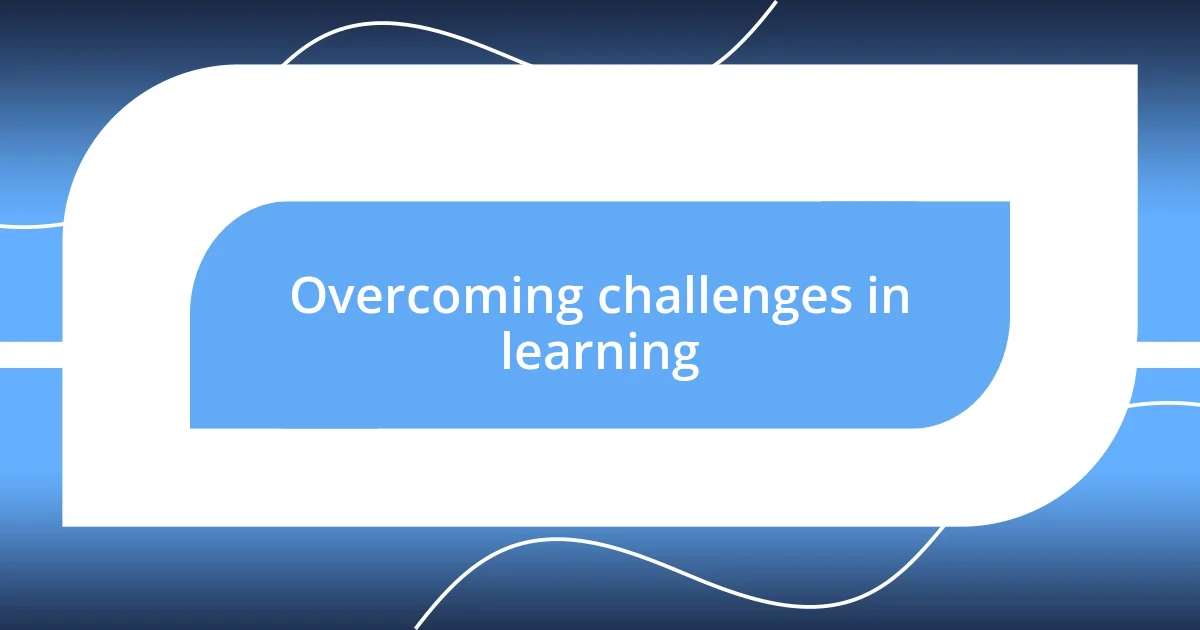
Overcoming challenges in learning
Overcoming challenges in learning often requires a shift in mindset. I vividly recall struggling with self-doubt when tackling complex subjects. I specifically remember a time when I felt overwhelmed by statistics. Instead of giving up, I decided to break it down into smaller, bite-sized pieces. By focusing on one concept at a time, I transformed that daunting challenge into something manageable and even enjoyable. Have you ever faced a similar hurdle? Finding that clarity can really change the game.
Another challenge can often be distractions, especially in our fast-paced world. I used to find myself constantly checking my phone while trying to memorize vocabulary for a language course. It was frustrating! So, I devised a simple strategy: I now put my phone on airplane mode and set a timer for focused, distraction-free learning sessions. Those uninterrupted moments have become some of the most productive and rewarding time I spend each day. Have you ever noticed how a little adjustment can lead to significant improvements?
Lastly, I’ve found that self-care plays a crucial role in overcoming learning obstacles. It’s easy to feel burnt out if I’m pushing myself too hard without breaks. I remember a particularly tough week when I didn’t take time to recharge and noticed my motivation waning. That was a wake-up call! Now, I make it a point to step away, go for a walk, or engage in a hobby that brings me joy. Those small acts of self-care remind me that learning is a marathon, not a sprint. What do you do to ensure you stay refreshed and ready to learn?

